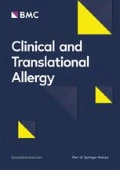The term pollen-food allergy syndrome (PFAS) defines a series of clinical symptoms appearing shortly after the ingestion of plant-derived foods in subjects with pollen allergy. The patients with PFAS are primarily allergic to pollen and subsequently react to food allergens as a consequence of the homology between pollen and plant-food proteins. The two highly conserved proteins responsible for the large majority of cases of pollen-food allergy syndrome are the pathogenesis-related proteins group 10 (PR-10), including the major birch pollen allergen Bet v 1 and homologous proteins in different fruits and vegetables, and profilin, a plant pan-allergen present in cell structure of all the vegetable kingdom. Although it has been generally thought that the clinical expression of the pollen food-allergy syndrome is uniquely the so-called “oral allergy syndrome”, recent reports suggest that the ingestion of particular foods may be associated with systemic symptoms as well. Recombinant PR-10 proteins and recombinant profilins from different sources are presently available for diagnostic purposes. The presentation will review the available data about the clinical expression, diagnosis, and therapy of the pollen-food allergy syndrome.
Author information
Authors and Affiliations
Rights and permissions
This article is published under license to BioMed Central Ltd. This is an open access article distributed under the terms of the Creative Commons Attribution License (http://creativecommons.org/licenses/by/2.0), which permits unrestricted use, distribution, and reproduction in any medium, provided the original work is properly cited.
About this article
Cite this article
Asero, R. Introductory lecture: Pollen food allergy syndrome. Clin Transl Allergy 1 (Suppl 1), S35 (2011). https://doi.org/10.1186/2045-7022-1-S1-S35
Published:
DOI: https://doi.org/10.1186/2045-7022-1-S1-S35

